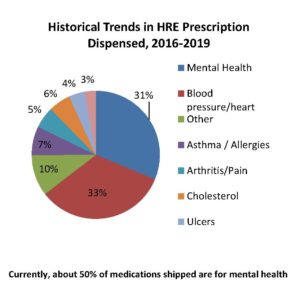PSM Member Spotlight: Rx Outreach
The Partnership for Safe Medicines (PSM) is a diverse collection of nonprofit organizations that all want to prevent counterfeit medications from getting into the hands of U.S. patients. However, each member organization has its own mission, and whenever possible, PSM likes to take the time to highlight the good work being done by our members.  Recently, we had the chance to talk with Darryl Munden, President of Rx Outreach, about the organization’s main mission and a second program that works to increase the success rate for newly released ex-offenders.
Recently, we had the chance to talk with Darryl Munden, President of Rx Outreach, about the organization’s main mission and a second program that works to increase the success rate for newly released ex-offenders.
Rx Outreach is the nation's largest non-profit mail-order pharmacy. Can you tell us about your organization?
The mission of Rx Outreach is to provide affordable medications for people in need. Originally started as an internal program at Express Scripts, we became a separate non-profit (501c3) organization in 2010. Our vision is a world where everyone has access to the medications they need. Since our inception, we have dispensed over 3.6 million critical, life-saving medications to more than 420,000 patients nationwide, saving them over $882M in prescription drug costs when compared to pharmacy retail prices. As a mail-order pharmacy, we ship 30, 90, or 180-day supplies of prescribed medications directly to patients’ homes or to their healthcare advocate - removing transportation barriers and alleviating privacy concerns. We have over 1,000 generic medication strengths to treat more than fifty physical and mental health conditions in our formulary. Our licensed pharmacy staff review, approve and dispense prescription medications by adhering to strict government standards. Our staff has maintained a dispensing accuracy rating of 99.98%, which is higher than most retail pharmacies.
Each year, Rx Outreach serves around 60,000 uninsured and underinsured patients nationwide – saving them more than $1,695 per person when compared to retail drug prices.
How do people enroll in Rx Outreach, and how do they get their medications?
People can check their income eligibility, look up our medications prices, and enroll on our website (www.rxoutreach.org), or they are welcome to call us (888-RXO-1234). We have traditionally served people whose annual household income is at or below 400% of the federal poverty level. However, due to increased need related to COVID-19, we have expanded our income guidelines. Once enrolled, a person can send his or her prescription or have it transferred to Rx Outreach. Also, some patients can enroll in Rx Outreach through their healthcare provider. We partner with hundreds of clinics throughout the country, and some of our Partner Clinics manage their patients through our Online Portal. We do not accept insurance, so the price that people see on our website is the actual price they would pay, including shipping. Full details are on our website.
One of your specialized medication programs provides medication to people recently released from prison. Can you tell us about this Healthy Reentry program, why it was created, and why it is important?
The incarceration rate in the United States is one of the highest in the world. Newly released ex-offenders are a highly vulnerable population as they face challenges of unemployment, judgment, and lack of insurance. Also, most ex-offenders are low-income earners and suffer from a high rate of physical and mental illness, which makes the transition back into society even more difficult.
Compounding their challenge is a widespread healthcare gap. In many states, upon release from prison, there is a delay in obtaining medication. An ex-inmate is given approximately 3 to 30 days of medicine to manage their mental and physical health needs. Within this time frame, they must be accepted in a medical practice and obtain a new prescription. Since it can take months to establish an appointment, most ex-offenders experience a medication gap. This medication gap then contributes to ex-offenders self-medicating, re-offending, and returning to prison. The five-year recidivism rate of 76.6% for inmates released from state prisons is due, in part, to the medication gap.
We created the Healthy Reentry program to fill that medication gap by providing an additional 60 days of medication to the ex-offender at no cost until they can establish an appointment at a new medical practice.  We settled on this amount of time after focus groups comprised of ex-offenders and reentry stakeholders determined that 90 days of bridge medication (a 30-day supply upon release and two additional 30-day supplies) provided sufficient time to fill the medication gap. The program pilot was launched in 2016 in the Missouri Department of Corrections (DOC) for offenders released to the St. Louis area. By January 2018, the program had expanded to the entire state of Missouri. Since 2016, with the help of generous donors, we have dispensed more than 47,000 prescriptions, free of charge, to nearly 8,000 people leaving Missouri correctional facilities on probation or parole. This program is a collaboration between a non-profit entity (Rx Outreach), a for-profit entity (Corizon Health), and a government entity (Missouri's Probation and Parole Office).
We settled on this amount of time after focus groups comprised of ex-offenders and reentry stakeholders determined that 90 days of bridge medication (a 30-day supply upon release and two additional 30-day supplies) provided sufficient time to fill the medication gap. The program pilot was launched in 2016 in the Missouri Department of Corrections (DOC) for offenders released to the St. Louis area. By January 2018, the program had expanded to the entire state of Missouri. Since 2016, with the help of generous donors, we have dispensed more than 47,000 prescriptions, free of charge, to nearly 8,000 people leaving Missouri correctional facilities on probation or parole. This program is a collaboration between a non-profit entity (Rx Outreach), a for-profit entity (Corizon Health), and a government entity (Missouri's Probation and Parole Office).
Lack of access to critical medication during the early months post-release can create a significant barrier to successful reintegration into the community, making this program essential. Communities can face grave consequences when ex-offenders do not have access to their medications. Ex-offenders, especially those with mental illness, might try to self-medicate, use emergency room resources to access medicines, or fail to transition successfully back into our neighborhoods. Emergency room visits can cost thousands of dollars. These costs must be absorbed by the hospital or passed on to the unemployed, uninsured, ex-offender, creating a significant financial burden that does not get resolved.
You mentioned mental illness. How common is mental illness within correctional facilities?
According to the Bureau of Justice Statistics, nearly 40% of people in prison have a mental health illness. Multiple studies have shown that individuals with mental illness are more likely to be incarcerated than receive proper treatment. While incarcerated, many inmates report that this was their first time addressing mental health needs, thus beginning their journey to mental wellness. Inmates need to maintain their mental health upon release. Research shows that previously incarcerated men and women with mental health conditions are more likely to re-offend when they do not have access to their prescribed medications. Fifty-two percent of our Healthy Reentry patients from 2016 to 2018 received mental health medications. Compared to the general population, ex-offenders are two to four times more likely to be diagnosed with a severe mental illness. These factors make the transition back into society difficult. Nationally, more than fifty percent of ex-offenders will return to prison within one year of release. In Missouri, about 1 in 5 ex-offenders were re-incarcerated within the first year. We desire to help establish a continuum of care from prison to community to help these individuals transition safely back into the community.
Post-incarceration support differs by state, right? How is your program funded?
Yes, post-incarceration support varies widely by state. Both Ohio and Iowa provide strong support for released prisoners. Data from our Healthy Reentry evaluation report shows that Ohio provides the most extended duration of bridge medication support. All individuals recently released from Ohio correctional institutions receive a 14-day supply of medications in addition to a 90-day prescription to be filled within two weeks post-release. Iowa provides the strongest link through its unique SafeNetRx voucher program. In contrast, some states do not offer any bridge medication support for ex-offenders.
In fact, ex-offenders need support systems that may take months to find and set up. They need assistance finding housing, healthcare coverage, and employment, so they can successfully transition into their community. Continuity of care is essential for successful reentry and the reduction of recidivism. Accessing community resources varies from state to state. In Missouri, for example, probation and parole officers provide much of the post-incarceration support by working closely with non-profit organizations and like-minded community agencies. Our Healthy Reentry program’s success is mostly due to the parole officers, especially those with significant mental health caseloads.
From 2016 through 2019, Healthy Reentry was funded entirely through grants. Since then, states submit requests for proposals to have this funded by the bidding contractors. Both Missouri and Kansas Departments of Corrections have requested proposals for Healthy Reentry to provide bridge medications. Since this program is worked into the bid, the state appropriations fund manages the bill and there is no longer a need to seek funding from grants or donations. Local jails may have the option of placing this into bids if they use a private contractor. Otherwise, local courts and jails may need to seek donations or grants through Rx Outreach's partnership or other funding sources.
What does the future hold for Healthy Reentry, and how can people learn more about bringing it to their communities?
Healthy Reentry will soon be implemented in Kansas in partnership with the Kansas Department of Corrections and Centurion (a prison healthcare provider) to provide bridge medications. We also have a partnership with the St. Louis County Mental Health Court to provide mental health medications to an individual recently released under their supervision, but this effort is delayed due to COVID-19.
We would also like to further evaluate Healthy Reentry's efficacy. A previous program evaluation conducted by a professor at the University of Missouri was positive, and a doctoral team from St. Louis University has completed even more data analysis. We hope to work with more researchers to fine-tune the program and help us to deliver medicine to the underserved ex-offender population.
We're excited for this program to expand since it serves as a safety net and helps sustain the health of our most vulnerable population during a very important transition in their lives. To learn more about the Healthy Reentry program, please email HealthyReentry@rxoutreach.org.